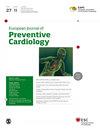Favorable cardiovascular risk profile and 10-year coronary heart disease incidence in women and men: results from the Progetto CUORE.
European Journal of Cardiovascular Prevention & Rehabilitation
Pub Date : 2006-08-01
DOI:10.1097/01.hjr.0000221866.27039.4b
引用次数: 75
Abstract
Background Cardiovascular risk factor research has recently broadened its focus based on new data indicating the benefits of low risk, i.e. favorable levels of all major risk factors. The aims of this study were to assess further the relation of low risk to coronary heart disease risk, and implications for prevention. Design We conducted a prospective population-based Italian study, of 7438 men and 13 009 women aged 35–69 years, with a mean follow-up of 10.4 years and validated first coronary events. Methods Baseline coronary heart disease risk was classified into three categories: low risk; unfavorable but not high risk; and high risk. To analyze the relation of these risk profiles to coronary heart disease incidence, age-adjusted, sex-averaged coronary heart disease incidence was calculated for persons free of coronary heart disease and stroke, stratified as baseline low risk, unfavorable but not high risk or high risk. To assess the independent relationship of individual risk factors to coronary heart disease incidence, multivariate proportional hazards models were computed for combinations of risk factors. Results Only 2.7% of participants met low risk criteria; 81.4% were high risk. Age-adjusted coronary heart disease incidence for the whole cohort was 37.1 out of 10000 person-years (men 59.0; women 15.3). No coronary heart disease events occurred in low-risk men, only two in low-risk women. For women and men who were not high risk, the age-sex standardized coronary heart disease rate was 62% lower than for high-risk participants. Blood pressure, need for antihypertensive medication, smoking, hyperglycemia, diabetes, total and high-density lipoprotein cholesterol were independently related to coronary heart disease risk. Conclusions Favorable levels of all modifiable readily measured risk factors - rare among Italian adults - assure minimal coronary heart disease risk. Population-wide prevention is needed, especially improved lifestyles, to increase the proportion of the population at low risk.有利的心血管风险概况和10年男性和女性冠心病发病率:来自Progetto CUORE的结果
背景:心血管危险因素研究最近扩大了其重点,基于新的数据表明低风险的好处,即所有主要危险因素的有利水平。本研究的目的是进一步评估低风险与冠心病风险的关系,以及预防的意义。设计:我们在意大利进行了一项基于人群的前瞻性研究,7438名男性和13009名女性,年龄在35-69岁之间,平均随访10.4年,并验证了首次冠状动脉事件。方法:将基线冠心病危险分为3类:低危;不利但风险不高的;而且风险很高。为了分析这些风险概况与冠心病发病率的关系,计算无冠心病和卒中的人群的年龄调整后的、性别平均的冠心病发病率,按基线低风险、不利但不高风险或高风险进行分层。为了评估个体危险因素与冠心病发病率的独立关系,对危险因素组合计算了多变量比例危险模型。结果:只有2.7%的参与者符合低风险标准;81.4%为高危人群。整个队列的年龄调整冠心病发病率为37.1 / 10000人年(男性59.0;女性15.3)。低风险男性无冠心病事件发生,低风险女性仅有2例。对于非高风险的女性和男性,年龄-性别标准化的冠心病发病率比高风险参与者低62%。血压、降压药需求、吸烟、高血糖、糖尿病、总脂蛋白胆固醇和高密度脂蛋白胆固醇与冠心病风险独立相关。结论:所有可改变的容易测量的危险因素的有利水平-在意大利成年人中罕见-确保最小的冠心病风险。需要进行全民预防,特别是改善生活方式,以增加低风险人口的比例。
本文章由计算机程序翻译,如有差异,请以英文原文为准。
求助全文
约1分钟内获得全文
求助全文

 求助内容:
求助内容: 应助结果提醒方式:
应助结果提醒方式:


